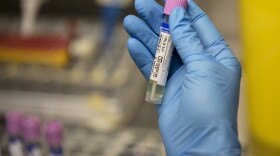The CDC is tracking a monkeypox outbreak this year. Previously, monkeypox was spread through international travel and contact with imported animals. Now, countries like the United States that don't normally report monkeypox are noticing an increase of cases. The CDC confirmed 9,492 cases in the U.S. as of Aug. 9.
Here's what you need to know about the virus, the cases in our state, and vaccination options.
What is monkeypox?
According to the CDC, the monkeypox virus spreads through close, personal, skin-to-skin contact. This can also include touching the rash, scabs or bodily fluids of someone infected, touching objects or fabrics that have been used by someone infected, or contact with respiratory secretions.
Some direct contact could be intimate, such as sexual contact, hugging, kissing, massaging, and touching fabrics or objects used during sex that have not been disinfected.
The CDC made a list of signs and symptoms of monkeypox, including:
- A rash located on or near the genitals, or other areas of the body such as hand, feet, chest, face, and mouth.
- This rash, initially looking like pimples or blisters, could go through several stages, like scabbing, before fully healing.
- Fever
- Chills
- Swollen lymph nodes
- Exhaustion
- Muscle and back aches
- Headache
- Respiratory symptoms
Infected people may only get a few of the symptoms listed above. These symptoms can last two to four weeks. They start within three weeks of exposure.
How many cases are in Michigan?
The state reports 77 confirmed monkeypox cases in Michigan as of August 9. That's 15 more than the reported cases on Aug. 3.
Visual examples of the monkeypox rash and resources for the public and healthcare professionals can be found on michigan.gov.
Should I get vaccinated?
The Michigan Department of Health and Human Services (MDHHS) has put together a vaccine strategy.
Monkeypox is similar to smallpox, so antiviral drugs and vaccines used to treat smallpox could be used to treat the monkeypox virus.
According to the MDHHS, Michigan is receiving vaccine allocations from the Strategic National Stockpile in accordance with the number of cases and population of high-risk individuals. A total of 7,618 allocations were shipped to Michigan as of August 8.
Eligible individuals may be contacted by their local health department about receiving the vaccine if they have been identified as a close contact. Those who know they’ve been in close contact with someone infected should call their local health department for more information.
A new expansion allows more Michiganders to be eligible for the vaccine: anyone who plans to have multiple sex partners, sex workers, anyone whose partner engages in "higher-risk sexual activities," close contacts of people who’ve been exposed to monkeypox or “engaged in higher-risk activities,” people who plan to have close contact at a “high-risk event,” and anyone living with HIV or taking HIV pre-exposure prophylaxis.








